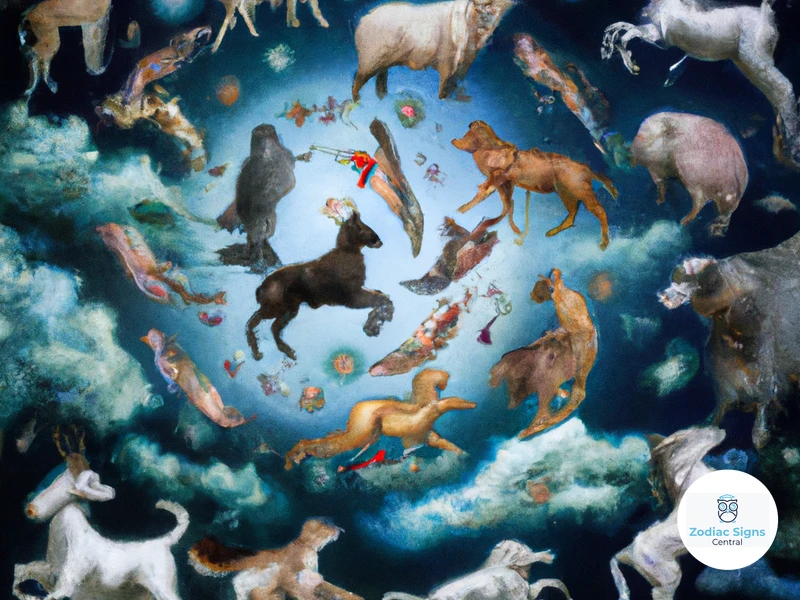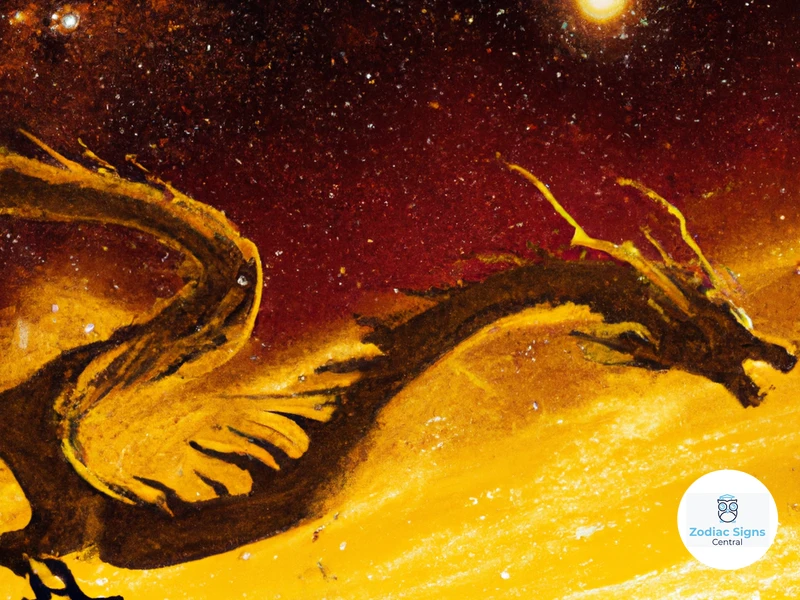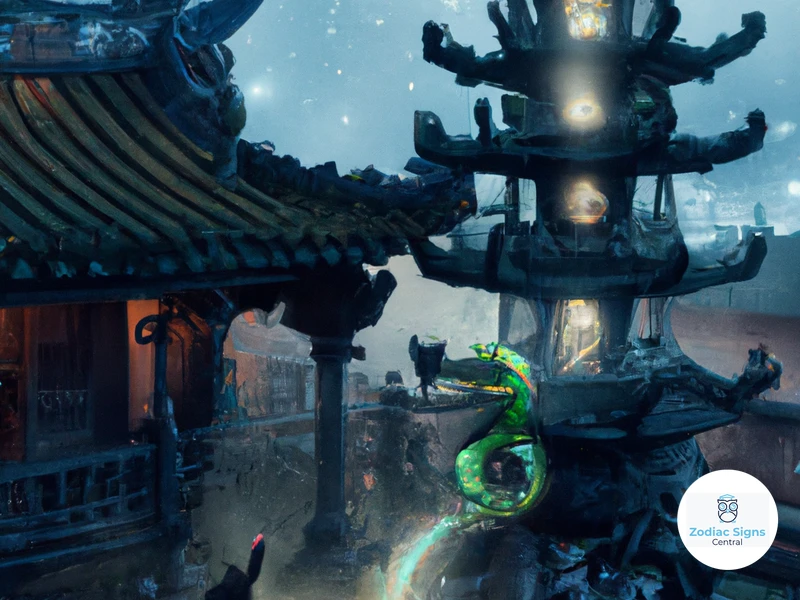Ancient China is known for its rich cultural heritage and deep spiritual beliefs. Among the many aspects that shaped their society, astrology and rituals played a crucial role. The Chinese had a unique and intricate system of understanding the cosmic forces and their influence on human life. This article explores the fascinating world of ancient Chinese astrology, delving into concepts such as Yin and Yang, the Five Elements, and the Chinese Zodiac. It uncovers the astrological rituals and practices that were integral to Chinese society, including Qi Gong, Feng Shui, and divination techniques. By understanding the profound impact of astrology on Chinese society, we can gain valuable insights into their beliefs and the influence it had on their everyday lives.
Ancient Chinese Astrology

Ancient Chinese astrology is a complex and intricate system that played a significant role in shaping Chinese society. At the heart of this astrology is the concept of Yin and Yang, which represents the dualistic nature of the universe. Yin is associated with darkness, femininity, and passivity, while Yang represents light, masculinity, and activity. These opposing forces are believed to interact and influence all aspects of life, including human behavior, natural phenomena, and celestial events. Another fundamental principle in Chinese astrology is the concept of The Five Elements. These elements, namely wood, fire, earth, metal, and water, are seen as the building blocks of the universe, each possessing unique qualities and characteristics. The interaction between these elements is believed to shape personality traits, health, and destiny. The Chinese Zodiac, consisting of twelve animal signs, is another crucial component of ancient Chinese astrology. Each animal sign represents a specific year and is believed to influence an individual’s characteristics and fortune. The interpretation of one’s Chinese Zodiac sign plays a vital role in matchmaking, choosing names, and determining auspicious dates for important life events. Ancient Chinese astrology offers a comprehensive and holistic understanding of the universe and its impact on human life. It continues to be practiced and valued in Chinese culture to this day.
1. Yin and Yang
Ancient Chinese astrology places great emphasis on the concept of Yin and Yang. Yin and Yang represent two opposing forces that exist in harmony and balance. Yin is associated with darkness, femininity, passivity, and the moon, while Yang represents light, masculinity, activity, and the sun. These forces are not seen as absolute, but rather as complementary aspects of the same whole. The interaction between Yin and Yang is believed to be the driving force behind the cycles of nature and the ebb and flow of life. It is believed that everything in the universe, including human beings, is influenced by the balance and interplay of these two forces.
In Chinese astrology, the concept of Yin and Yang is applied to various aspects of life. It is believed that each person has an inherent balance of Yin and Yang energy within them. This balance is thought to determine an individual’s personality, preferences, and even health. For example, a person with a dominant Yin energy might exhibit characteristics such as introspection, sensitivity, and nurturing qualities, while a person with a dominant Yang energy might be more outgoing, assertive, and energetic.
The interplay of Yin and Yang is also evident in the interpretation of celestial events and their influence on human life. For example, the waxing and waning of the moon, a symbol of Yin energy, is believed to affect emotions and intuition. The movement of the sun, associated with Yang energy, is believed to influence vitality and outward expression. By understanding the delicate balance between Yin and Yang, individuals can seek to harmonize these energies in their lives and achieve a sense of balance and well-being.
Yin and Yang are not static but are in a constant state of flux. They are depicted in the famous Yin-Yang symbol, where a small dot of Yin resides within Yang, and a small dot of Yang resides within Yin. This symbolizes the idea that within every Yin aspect, there is a seed of Yang, and vice versa. This balance and interdependence of Yin and Yang are fundamental principles in ancient Chinese astrology and permeate many aspects of Chinese culture, including medicine, philosophy, and spiritual practices.
2. The Five Elements
In ancient Chinese astrology, the concept of The Five Elements is integral to understanding the natural forces at work in the universe. These elements, known as wood, fire, earth, metal, and water, are not only associated with physical substances but also represent a range of qualities and characteristics. Each element has a unique relationship with the others, creating a dynamic balance in the world. Wood is associated with growth, flexibility, and creativity. Fire represents passion, transformation, and energy. Earth symbolizes stability, nurturing, and grounding. Metal is linked to strength, organization, and focus. Water embodies wisdom, adaptability, and intuition. The interaction between these elements is believed to influence various aspects of life, including personality traits, relationships, health, and destiny.
In Chinese astrology, the Five Elements are not only connected to the material world but also to the cycles of nature and the energy flow within the body. The elements are associated with specific organs, seasons, colors, and directions. For example, wood is related to the liver, spring, green, and the east, while fire is connected to the heart, summer, red, and the south. Understanding the interactions and imbalances between these elements is crucial for maintaining harmony and well-being.
The Five Elements are also used in Chinese astrology to determine an individual’s destiny and compatibility with others. Each person is believed to have a dominant element based on their birth year. This element provides insights into their personality traits and life path. Additionally, the interactions between the elements can reveal compatibility or conflicts between individuals. For example, wood fuels fire, but fire can burn wood, indicating a mutually beneficial or potentially destructive relationship depending on the circumstances.
The Five Elements play a significant role in various aspects of Chinese culture and philosophy, such as traditional Chinese medicine, Feng Shui, and martial arts. They are considered fundamental building blocks that shape the world and offer a deeper understanding of the interconnectedness of all things. By studying the Five Elements, individuals can gain insight into their own nature and navigate life’s challenges with a harmonious approach.
/astrology-ayurveda-holistic-health/
3. The Chinese Zodiac
The Chinese Zodiac, also known as Shengxiao, is a fascinating aspect of ancient Chinese astrology. It consists of twelve animal signs, each representing a specific year. The twelve animals in the Chinese Zodiac are the Rat, Ox, Tiger, Rabbit, Dragon, Snake, Horse, Sheep, Monkey, Rooster, Dog, and Pig. According to legend, these animals were chosen by the Jade Emperor based on their arrival order in a race. Each animal sign is believed to possess certain traits and characteristics that influence a person’s personality and destiny. For example, those born in the Year of the Rat are considered resourceful and intelligent, while those born in the Year of the Dragon are seen as ambitious and confident. The Chinese Zodiac not only determines an individual’s personality but also plays a significant role in matchmaking, selecting auspicious dates for weddings, and naming children. Each animal sign is associated with one of the five elements (wood, fire, earth, metal, and water), creating a 60-year cycle known as the Sexagenary cycle. This cycle further influences an individual’s fate and fortune. The Chinese Zodiac continues to be an important cultural symbol in Chinese society, with celebrations and parades held each year to honor the animal sign of that year. Whether it is determining compatibility or understanding one’s strengths and weaknesses, the Chinese Zodiac offers valuable insights into an individual’s character and provides a unique perspective on astrology.
Astrological Rituals and Practices
Astrological rituals and practices held great significance in ancient Chinese society, offering a means to connect with the celestial forces and harness their energy. One notable practice is Qi Gong, which combines breathing exercises, meditation, and movement to cultivate and balance one’s vital energy, or Qi. Qi Gong was believed to enhance physical health, mental clarity, and spiritual enlightenment. Another prominent practice is Feng Shui, which focuses on harmonizing the energy flow in one’s environment to promote prosperity and well-being. By arranging furniture, objects, and structures in accordance with Feng Shui principles, individuals believed they could optimize luck and success. Divination techniques were also integral to astrological rituals, with methods such as palm reading, the use of oracle bones, and interpreting the I Ching. These practices provided insight into the future and guidance for decision-making. Astrological rituals and practices in ancient China offered individuals a way to navigate the cosmic forces and seek balance and prosperity in their lives. They were deeply ingrained in the culture and continue to be valued and practiced in modern times.
1. Qi Gong
Qi Gong is an ancient Chinese practice that combines movement, breath control, and meditation to cultivate and balance the body’s vital energy, known as Qi. The term “Qi Gong” translates to “energy work” or “skillful practice of Qi.” It is rooted in the belief that Qi flows through the body along specific channels or meridians, and by practicing Qi Gong, one can enhance the flow of Qi, improve health, and promote spiritual well-being. Qi Gong encompasses a wide range of techniques, including gentle movements, postures, self-massage, and breathing exercises. These practices are designed to harmonize the body, mind, and spirit, and restore the balance of Yin and Yang within the individual. Regular practice of Qi Gong is believed to promote longevity, reduce stress, increase vitality, and enhance overall well-being. Qi Gong also plays a significant role in Traditional Chinese Medicine, as it is used to complement medical treatments and prevent illness by maintaining the free flow of Qi throughout the body. This ancient practice continues to be widely embraced and passed down through generations, making it an integral part of Chinese culture and spirituality.
2. Feng Shui
Feng Shui, an ancient Chinese practice, revolves around the arrangement and flow of energy in one’s surroundings. It is based on the belief that the placement of objects and the design of a space can harmonize the flow of positive energy and bring good fortune. Feng Shui, which translates to “wind and water,” emphasizes creating a balanced and harmonious environment to enhance well-being and prosperity. The practice of Feng Shui takes into account various factors, including the orientation of the building, the arrangement of furniture, and the use of colors and elements. The goal is to achieve a harmonious balance between Yin and Yang energies in order to promote positive chi, or life-force energy. In Feng Shui, certain objects and symbols are believed to bring luck and fortune, such as the dragon, symbolizing power and strength, and the phoenix, representing rebirth and abundance. Feng Shui is not limited to interior design and architecture; it also extends to selecting auspicious dates for important events and activities. By aligning one’s environment with the principles of Feng Shui, individuals can enhance their overall well-being, attract positive energy, and create a harmonious living or working space. If you’re interested in learning more about how astrology and Feng Shui intersect, check out this article on Neptune transits and emotional vulnerability.
3. Divination Techniques
Impact of Astrology on Chinese Society

The impact of astrology on Chinese society has been profound and far-reaching. For thousands of years, astrology has played a central role in various aspects of Chinese culture, from personal beliefs and spirituality to social customs and traditions. It has influenced everything from individual decision-making to government policies.
1. Personal Beliefs and Decision-Making: Astrology has guided individuals in making important decisions about their lives. Many Chinese people consult astrologers or fortune tellers to seek guidance on matters such as marriage, career, and health. The Chinese Zodiac, in particular, is often referenced when making choices regarding compatibility in relationships or the selection of auspicious dates for events.
2. Social Customs and Traditions: Astrology has deeply influenced social customs and traditions in Chinese society. For instance, during the Lunar New Year celebrations, people pay great attention to their Zodiac animal and its associated characteristics. Different animal signs are believed to have different impacts on the year ahead, leading to specific rituals and traditions to attract good fortune and ward off bad luck.
3. Government and Public Policies: Astrology has even influenced governmental and public policies in ancient China. Emperors and rulers often consulted astrologers to determine the most auspicious dates for important events such as coronations, battles, and harvests. The alignment of celestial bodies and the interpretation of astrology played a significant role in decision-making at the highest level.
4. Cultural Identity: Astrology has become intertwined with Chinese cultural identity. It is present in art, literature, and even daily conversations. The Chinese Zodiac has become a well-known symbol worldwide and is often associated with the unique cultural heritage of China.
Astrology has shaped Chinese society by providing a framework to understand the universe, guiding personal choices, and influencing social norms. It continues to be an integral part of Chinese culture, reflecting the strong connection between the people and the cosmos. The impact of astrology on Chinese society remains evident even in the modern era, as many Chinese individuals still value and incorporate astrological beliefs into their everyday lives.
Conclusion
In conclusion, ancient Chinese astrology and rituals held immense significance in shaping Chinese society and culture. The intricate understanding of cosmic forces, such as Yin and Yang and the Five Elements, provided a framework for comprehending the interplay between the universe and human existence. The Chinese Zodiac, with its twelve animal signs, offered a personalized approach to understanding one’s character traits and destiny. Astrological rituals and practices like Qi Gong, Feng Shui, and divination techniques were employed as means to harness positive energy, promote well-being, and make important life decisions. The impact of astrology on Chinese society can be seen in various aspects of their lives, from naming conventions to matchmaking and even architectural design. It continues to be an integral part of Chinese culture, carrying on ancient traditions and guiding individuals in navigating their lives. By embracing astrology, the Chinese people have cultivated a deep spiritual connection with the cosmos, seeking harmony and balance in their existence. Astrology is not just a belief system for them; it is a way of life that influences their choices and shapes their aspirations. To truly understand the profound influence of astrology in Chinese society, one must delve into its teachings and practices, appreciating the intricate wisdom passed down through generations. It is a reminder that we are all interconnected with the cosmic energies that surround us, and by aligning ourselves with these energies, we can lead a more fulfilling and harmonious life.
Frequently Asked Questions

1. How did Yin and Yang influence ancient Chinese astrology?
Yin and Yang were fundamental concepts in ancient Chinese astrology. They represent the dualistic forces of the universe and their interplay in shaping all aspects of life, including astrology. Yin and Yang influence the interpretation of celestial events, natural phenomena, and human behavior.
2. What are the Five Elements in Chinese astrology?
The Five Elements in Chinese astrology are wood, fire, earth, metal, and water. Each element possesses unique qualities and characteristics, impacting personality traits, health, and destiny. The interactions between these elements form the basis of astrological analysis in Chinese culture.
3. How does the Chinese Zodiac work in astrology?
The Chinese Zodiac is a cycle of twelve animal signs that represent specific years. Each animal sign is associated with certain characteristics and influences an individual’s fortune. The Chinese Zodiac is used for matchmaking, naming conventions, and determining auspicious dates for life events.
4. What is Qi Gong and its relation to astrology?
Qi Gong is a form of ancient Chinese energy practice that focuses on harnessing and guiding Qi, or life force energy. It is closely related to astrology as it seeks to balance and enhance the flow of cosmic energy within the body and align it with the movements of celestial bodies.
5. How does Feng Shui relate to astrology?
Feng Shui is the practice of arranging the physical environment to harmonize with the energy or Qi flows. It is connected to astrology as it considers the influence of celestial bodies in determining the most auspicious placement of objects and structures to promote positive energy flow.
6. What are some common divination techniques in ancient Chinese astrology?
Ancient Chinese astrology incorporates various divination techniques, such as palmistry, face reading, and the use of oracle bones. These methods were used to gain insights into an individual’s personality, predict fortunes, and make important life decisions.
7. How did astrology impact social and cultural aspects of ancient Chinese society?
Astrology had a profound impact on ancient Chinese society. It influenced everything from healthcare and medicine to agriculture and government. Astrological beliefs shaped social conventions, influenced personal and business relationships, and guided decision-making processes.
8. How accurate and reliable was ancient Chinese astrology?
Ancient Chinese astrology was widely believed to be accurate and reliable. It was deeply ingrained in Chinese culture and played a significant role in shaping various aspects of society. However, the interpretation and application of astrological principles varied among practitioners and individuals.
9. Is ancient Chinese astrology still practiced today?
Yes, ancient Chinese astrology is still widely practiced in contemporary Chinese culture. Many people consult astrologers for advice on important life events, such as marriage, business ventures, and personal decisions. Chinese New Year celebrations also involve the interpretation of zodiac signs for the upcoming year.
10. How can understanding ancient Chinese astrology benefit us today?
Understanding ancient Chinese astrology can provide valuable insights into Chinese culture, beliefs, and the interconnectedness of cosmic forces and human life. It offers a different perspective on astrology and encourages a holistic approach to well-being and decision-making.
References
Frequently Asked Questions

1. What is the significance of yin and yang in ancient Chinese astrology?
In ancient Chinese astrology, yin and yang are two opposing forces that represent the balance and harmony in the universe. Yin represents the feminine, passive, and dark aspects, while yang represents the masculine, active, and light aspects. The concept of yin and yang is fundamental in understanding the energies and influences in astrology.
2. How do the five elements relate to astrology in ancient China?
The five elements, which are wood, fire, earth, metal, and water, are believed to be the building blocks of the universe in ancient Chinese astrology. Each element has its own characteristics and associations with specific directions, colors, and qualities. These elements are used to explain the interactions and relationships between different astrological signs and personalities.
3. What is the Chinese zodiac and how does it impact astrology?
The Chinese zodiac is a cycle of twelve animal signs, each representing a year in a 12-year cycle. These animal signs are Rat, Ox, Tiger, Rabbit, Dragon, Snake, Horse, Sheep, Monkey, Rooster, Dog, and Pig. Each animal sign is believed to have specific traits and influences on a person’s personality and destiny. The Chinese zodiac is widely used in astrology to determine compatibility, make predictions, and understand individual characteristics.
4. What is Qi Gong and how does it relate to astrology?
Qi Gong is a traditional Chinese practice that combines movement, breathing techniques, and meditation to cultivate and balance the body’s energy. It is believed that practicing Qi Gong enhances the flow of qi, or life force energy, in the body, which has connections with astrology. Qi Gong exercises are often performed to align oneself with the cosmic energies and improve overall well-being.
5. What is Feng Shui and how does it play a role in astrology?
Feng Shui is an ancient Chinese system of arranging the environment to create harmonious and balanced energy. It is closely connected to astrology as it aims to enhance the flow of positive energy or qi in a space. Feng Shui principles can be applied to individual astrology by arranging the living or working spaces according to the specific elements and energies associated with a person’s astrological sign.
6. What are some divination techniques used in ancient Chinese astrology?
Ancient Chinese astrology employed various divination techniques to make predictions and gain insights into the future. Some popular divination methods include I Ching or the Book of Changes, which involves interpreting hexagrams to understand different situations, and Chinese astrology birth charts, which use a person’s birth date and time to analyze their destiny and personality traits.
7. How has astrology influenced Chinese society throughout history?
Astrology has had a significant impact on Chinese society for centuries. It has influenced decision-making in various aspects of life, ranging from marriage and relationships to business and politics. Astrology also plays a role in determining auspicious dates for important events and celebrations. Many ancient Chinese emperors consulted astrologers for guidance and making important decisions.
8. Can anyone practice astrology and its associated rituals?
Astrology and its associated rituals are open to anyone interested in Chinese culture and metaphysical practices. However, mastering astrology requires a deep understanding of its principles and symbols. It is recommended to learn from experienced practitioners or seek guidance from knowledgeable sources before delving into astrology and its rituals.
9. Is there a scientific basis for ancient Chinese astrology?
Ancient Chinese astrology is rooted in traditional beliefs and philosophies rather than scientific principles. It is considered a metaphysical practice that attempts to understand and interpret the energies of the universe. While there may be cultural and psychological value in astrology, its predictions and explanations do not align with empirical scientific methods.
10. How is astrology perceived in modern Chinese society?
Astrology continues to have a significant presence in modern Chinese society. Many people still consult astrologers for advice on personal matters and important life decisions. However, its influence is not limited to individuals alone. Astrology is often incorporated in various aspects of Chinese popular culture, including entertainment, advertisements, and even political discourse.






